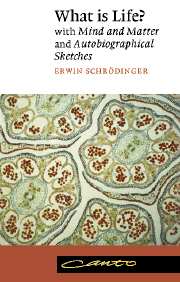Book contents
- Frontmatter
- Contents
- WHAT IS LIFE?
- Foreword
- Preface
- 1 THE CLASSICAL PHYSICIST'S APPROACH TO THE SUBJECT
- 2 THE HEREDITARY MECHANISM
- 3 MUTATIONS
- 4 THE QUANTUM-MECHANICAL EVIDENCE
- 5 DELBRÜCK'S MODEL DISCUSSED AND TESTED
- 6 ORDER, DISORDER AND ENTROPY
- 7 IS LIFE BASED ON THE LAWS OF PHYSICS?
- EPILOGUE. ON DETERMINISM AND FREE WILL
- MIND AND MATTER
- 1 THE PHYSICAL BASIS OF CONSCIOUSNESS
- 2 THE FUTURE OF UNDERSTANDING
- 3 THE PRINCIPLE OF OBJEGTIVATION
- 4 THE ARITHMETICAL PARADOX: THE ONENESS OF MIND
- 5 SCIENCE AND RELIGION
- 6 THE MYSTERY OF THE SENSUAL QUALITIES
- AUTOBIOGRAPHICAL SKETCHES
2 - THE FUTURE OF UNDERSTANDING
Published online by Cambridge University Press: 05 June 2013
- Frontmatter
- Contents
- WHAT IS LIFE?
- Foreword
- Preface
- 1 THE CLASSICAL PHYSICIST'S APPROACH TO THE SUBJECT
- 2 THE HEREDITARY MECHANISM
- 3 MUTATIONS
- 4 THE QUANTUM-MECHANICAL EVIDENCE
- 5 DELBRÜCK'S MODEL DISCUSSED AND TESTED
- 6 ORDER, DISORDER AND ENTROPY
- 7 IS LIFE BASED ON THE LAWS OF PHYSICS?
- EPILOGUE. ON DETERMINISM AND FREE WILL
- MIND AND MATTER
- 1 THE PHYSICAL BASIS OF CONSCIOUSNESS
- 2 THE FUTURE OF UNDERSTANDING
- 3 THE PRINCIPLE OF OBJEGTIVATION
- 4 THE ARITHMETICAL PARADOX: THE ONENESS OF MIND
- 5 SCIENCE AND RELIGION
- 6 THE MYSTERY OF THE SENSUAL QUALITIES
- AUTOBIOGRAPHICAL SKETCHES
Summary
A BIOLOGICAL BLIND ALLEY?
We may, I believe, regard it as extremely improbable that our understanding of the world represents any definite or final stage, a maximum or optimum in any respect. By this I do not mean merely that the continuation of our research in the various sciences, our philosophical studies and religious endeavour are likely to enhance and improve our present outlook. What we are likely to gain in this way in the next, say, two and a half millennia — estimating from what we have gained since Protagoras, Democritus and Antisthenes — is insignificant compared with what I am here alluding to. There is no reason whatever for believing that our brain is the supreme ne plus ultra of an organ of thought in which the world is reflected. It is more likely than not that a species could acquire a similar contraption whose corresponding imagery compares with ours as ours with that of the dog, or his in turn with that of a snail.
If this be so, then — though it is not relevant in principle — it interests us, as it were for personal reasons, whether anything of the sort could be reached on our globe by our own offspring or the offspring of some of us. The globe is all right. It is a fine young leasehold, still to run under acceptable conditions of living for about the time it took us (say 1,000 million years) to develop from the earliest beginnings into what we are now.
- Type
- Chapter
- Information
- What is Life?With Mind and Matter and Autobiographical Sketches, pp. 103 - 116Publisher: Cambridge University PressPrint publication year: 1992

